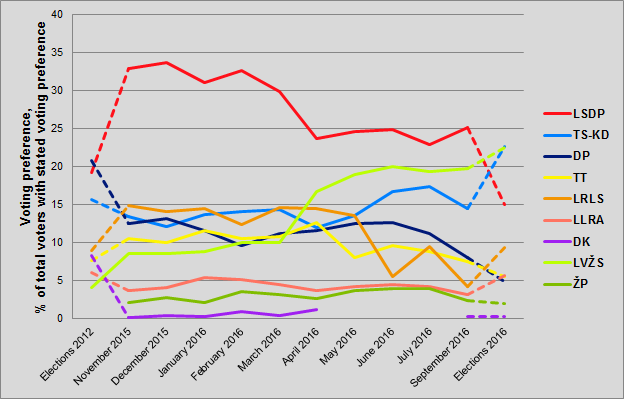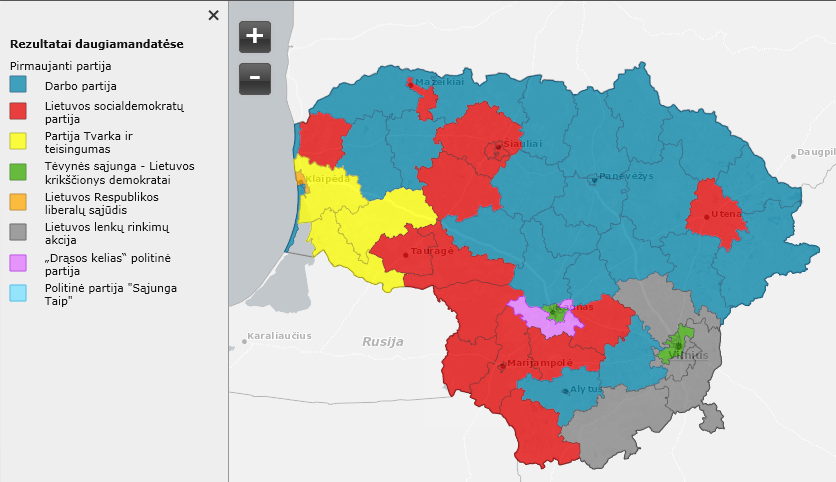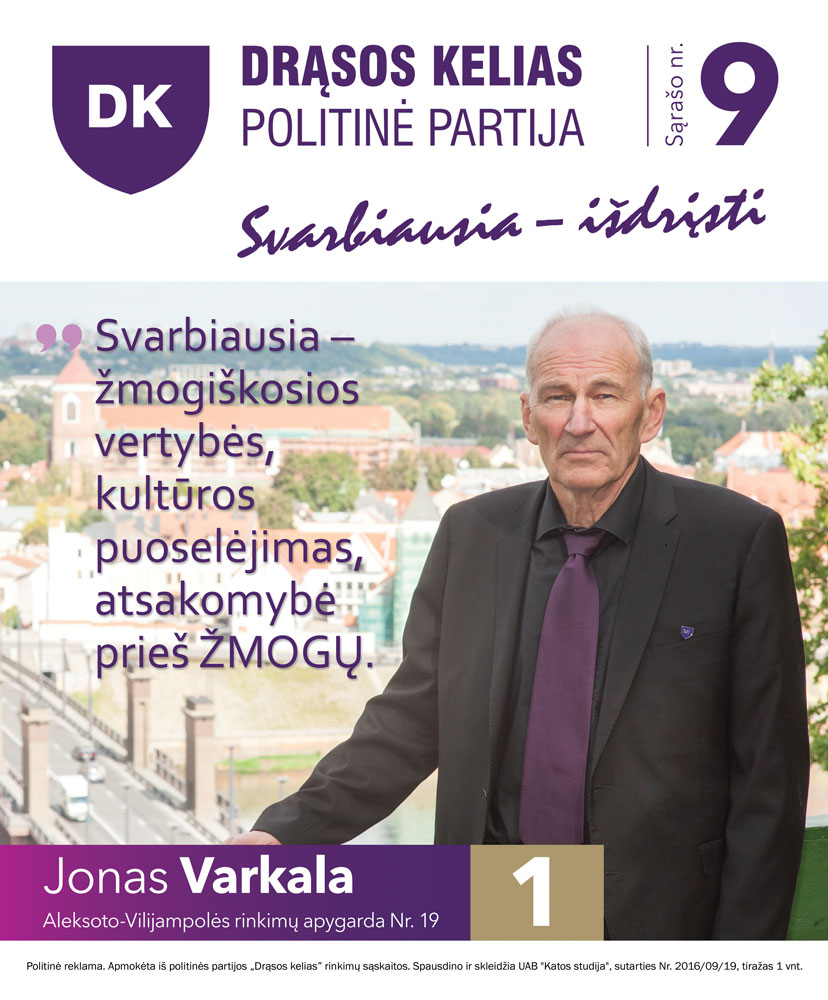Deleted
Deleted Member
Posts: 0
|
Post by Deleted on Oct 5, 2016 15:15:53 GMT
Yes, but there is second round on 23 October in those of the 71 single-seat constituencies where no candidate wins a majority in the first round. The remaining 70 seats are elected in one nationwide constituency by PR using Hare-Niemeyer for allocation and with a 5% threshold for parties and 7% for coalitions. In October their Constitutional Court ruled that allowing the largest constituency to be up to 50% larger than the smallest was unconstitutional (not giving equal weight to all votes) and ordered them redrawn to be between 90% and 110% of the average. So for the first time since independence they are using redrawn constituencies (incl. two new ones in Vilnius) and the rural/small town vote will count for less. |
|
Deleted
Deleted Member
Posts: 0
|
Post by Deleted on Oct 5, 2016 15:48:12 GMT
As one would expect for a country in that part of Europe Lithuania has fairly terrible parties. Though their Social Democrats are the most Social Democratic in the Baltics (low bar..). The Government: The Social Democrats (LSDP) (reestablished post-war party which later merged with the ex-Commies) under Algirdas Butkevičius (57); Labour Party (DP), populist rich mans tool founded in 2003 by Russian-born multi-millionaire Viktor Uspaskich which later merged with their Social Liberals; Order and Justice (TT), right-wing populists and NatCons who claim to be leftists. The opposition: The biggest opposition parties are the Conservative Homeland Union-Christian Democrats (TS-KD) and the Liberal Movement (LRLS), which despite its name are also Conservatives, but less nationalist and SoCon than Homeland Union. The SoCon/NatCon minority party Electoral Action of Poles (LLRA) in Lithuania were in government until 2014, populist anti-corruption Way of Courage (DK) and the small rural interests with a layer of token environmentalism Peasant and Greens Union (LVŽS). The Lithuanian Green Party (ŽP) are the actual Greens and at least big enough to be included in the polls.  |
|
mazuz
Conservative
Posts: 155 
|
Post by mazuz on Oct 5, 2016 15:54:59 GMT
I know very little of politics in Lithuania. Is political competition in Lithuania mainly characterized by genuine ideological differences (like, for instance, in Hungary) or by business interests and cronyism (like, for instance, in Slovakia) and do ideological differences ("the cute Wiki label") matter to a very small extent?
Do you happen to know what caused the surge in LVZS support?
|
|
Deleted
Deleted Member
Posts: 0
|
Post by Deleted on Oct 5, 2016 16:12:29 GMT
I know very little of politics in Lithuania. Is political competition in Lithuania mainly characterized by genuine ideological differences (like, for instance, in Hungary) or by business interests and cronyism (like, for instance, in Slovakia) and do ideological differences ("the cute Wiki label") matter to a very small extent? Do you happen to know what caused the surge in LVZS support? Well, apart from the Social Democrats (and Greens) they are all Conservative or populist in one way or another, and Labour is of course an oligarch party with no ideology. Their Social Democrats are like Smer in Slovakia capable of working with right wing populists, but seems to be genuinely centre-left on economics. The Liberals tanked after a big corruption scandals and the Peasant and Greens Union was their moderate voters preferred alternative - not hard right, not leftist and perceived to be generally uncorrupt. |
|
Deleted
Deleted Member
Posts: 0
|
Post by Deleted on Oct 5, 2016 16:35:21 GMT
The LVZS is also sort of an oligarch party as it is controlled by agro-businessman and self-styled patron of the arts Ramūnas Karbauskis, a charismatic farm boy from the north who transformed his home parish into an "exemplary local community", with its own theatre, newspaper, radio + started an anti-alcoholism crusade and (supposedly) made all people in his village teetotal. He also started and funds the Naisiai Theatre Festival (big summer event). They were joined by Minister of the Interior Saulius Skvernelis, who was a popular crime and corruption fighter (and coveted by the Social Democrats and Liberals).
They have had a grassroots approach with helping out local communities, working with them on projects etc. The party is said to be many voters second choice simply for not fighting internally and being seen as a "moral" party.
|
|
Foggy
Non-Aligned
Yn Ennill Yma
Posts: 6,135 
|
Post by Foggy on Oct 5, 2016 17:27:09 GMT
Yes, but there is second round on 23 October in those of the 71 single-seat constituencies where no candidate wins a majority in the first round. The remaining 70 seats are elected in one nationwide constituency by PR using Hare-Niemeyer for allocation and with a 5% threshold for parties and 7% for coalitions. In October their Constitutional Court ruled that allowing the largest constituency to be up to 50% larger than the smallest was unconstitutional (not giving equal weight to all votes) and ordered them redrawn to be between 90% and 110% of the average. So for the first time since independence they are using redrawn constituencies (incl. two new ones in Vilnius) and the rural/small town vote will count for less. Are they elected at the same time as the constituency run-offs? If so, that system strikes me as very open to manipulation. Interesting that this was ruled by a court rather than legislated for. I think that in a parallel MMP system, there is no need for the constituencies to be of roughly equal size, as long as they represent recognisable communities and aren't just drawn for partisan advantage. |
|
Deleted
Deleted Member
Posts: 0
|
Post by Deleted on Oct 5, 2016 17:40:43 GMT
Yes, but there is second round on 23 October in those of the 71 single-seat constituencies where no candidate wins a majority in the first round. The remaining 70 seats are elected in one nationwide constituency by PR using Hare-Niemeyer for allocation and with a 5% threshold for parties and 7% for coalitions. In October their Constitutional Court ruled that allowing the largest constituency to be up to 50% larger than the smallest was unconstitutional (not giving equal weight to all votes) and ordered them redrawn to be between 90% and 110% of the average. So for the first time since independence they are using redrawn constituencies (incl. two new ones in Vilnius) and the rural/small town vote will count for less. Are they elected at the same time as the constituency run-offs? If so, that system strikes me as very open to manipulation. Interesting that this was ruled by a court rather than legislated for. I think that in a parallel MMP system, there is no need for the constituencies to be of roughly equal size, as long as they represent recognisable communities and aren't just drawn for partisan advantage. No, PR seats and first round in the constituencies on 9 October, then constituency run-offs where necessary a fortnight later. |
|
Foggy
Non-Aligned
Yn Ennill Yma
Posts: 6,135 
|
Post by Foggy on Oct 5, 2016 18:06:54 GMT
All right. Doing it in that order appears to make more sense. The first two electoral methods I was exposed to (after the British and American) were the French two-round system and German MMP when I was studying both languages at A-level in 2002. Even back then, the thought of combining the two systems intrigued me.
Of course, logistical problems with that soon arise. Ideally they wouldn't release list vote figures until polls in the second round are closed to stop any attempt at tactical voting, but that probably wouldn't be deemed acceptable in this age of demand for instant access to information.
|
|
|
|
Post by Lord Twaddleford on Oct 5, 2016 19:00:30 GMT
All right. Doing it in that order appears to make more sense. The first two electoral methods I was exposed to (after the British and American) were the French two-round system and German MMP when I was studying both languages at A-level in 2002. Even back then, the thought of combining the two systems intrigued me. Of course, logistical problems with that soon arise. Ideally they wouldn't release list vote figures until polls in the second round are closed to stop any attempt at tactical voting, but that probably wouldn't be deemed acceptable in this age of demand for instant access to information. I think if you want to do any combination of AMS & run-off voting, it might be better to utilise IRV as opposed to the two round system (AV+, as I believe people a want to calling it); still requires the candidates in single member races to accquire an absolute majority, but lacks the logistical issues of two-round voting, and there'll be no need to withhold the list results either. |
|
Foggy
Non-Aligned
Yn Ennill Yma
Posts: 6,135 
|
Post by Foggy on Oct 5, 2016 19:56:11 GMT
Well, the Jenkins Report had indeed been published a few years earlier, so I was aware of that as well. It does seem like the more sensible way to combine the two systems, yes.
|
|
|
|
Post by aross on Oct 5, 2016 22:37:05 GMT
Interesting that this was ruled by a court rather than legislated for. I think that in a parallel MMP system, there is no need for the constituencies to be of roughly equal size, as long as they represent recognisable communities and aren't just drawn for partisan advantage. It's parallel voting rather than MMP. So Labour came third in seats last time despite being first (19.8%) in the national vote, though I don't have access to results by party in the SMCs. |
|
Foggy
Non-Aligned
Yn Ennill Yma
Posts: 6,135 
|
Post by Foggy on Oct 5, 2016 23:24:00 GMT
Interesting that this was ruled by a court rather than legislated for. I think that in a parallel MMP system, there is no need for the constituencies to be of roughly equal size, as long as they represent recognisable communities and aren't just drawn for partisan advantage. It's parallel voting rather than MMP. So Labour came third in seats last time despite being first (19.8%) in the national vote, though I don't have access to results by party in the SMCs. Parallel as in non-compensatory, like in Hungary? I already called it a parallel system, but sometimes that term is used to imply the number of top-up seats is essentially equal to the number of FPTP seats, as opposed to using it to mean that extra seats try to correct the imbalance from the single-member constituencies. Sounds like the system is fundamentally flawed (or Lithuanian voters are already savvy enough to use it tactically) if votes can get so far from matching seats. Then again, a 'victory' on under a fifth of the vote is somewhat of a weak mandate. |
|
|
|
Post by aross on Oct 6, 2016 0:29:48 GMT
It's parallel voting rather than MMP. So Labour came third in seats last time despite being first (19.8%) in the national vote, though I don't have access to results by party in the SMCs. ? I already called it a parallel system, but sometimes that term is used to imply the number of top-up seats is essentially equal to the number of FPTP seats, as opposed to using it to mean that extra seats try to correct the imbalance from the single-member constituencies. Sounds like the system is fundamentally flawed (or Lithuanian voters are already savvy enough to use it tactically) if votes can get so far from matching seats. Then again, a 'victory' on under a fifth of the vote is somewhat of a weak mandate. Yes. 70 list seats, 71 SMCs. Labour sounds like the sort of party that might lack a local base lots of places, so that could have been a factor. Map last time: ![]()  From top to bottom: Labour, LSDP, Order and Justice, Homeland Union, Liberal Movement, Electoral Action of Poles (self-explanatory), The Way of Courage (populists, appears to be defunct), YES Union. Actually, never mind, here we are.  Notice a) the disparities between the various results, probably depends on who exactly is counted for which party - plus the election was invalidated in two constituencies and b) the far lower turnout in the second round (unusual internationally, but makes sense in context). Well, and c) that's one of the most mental election result I've ever seen. |
|
Hash
Non-Aligned
Posts: 116 
|
Post by Hash on Oct 6, 2016 1:07:13 GMT
Way of Courage is more than populist - it was an amazing anti-paedo/anti-global paedo conspiracy party created in the wake of the crazy Drąsius Kedys paedophilia scandal. Apparently the party still exists but it truly has no chance, in large part because its founder and ex-MP Neringa Venckienė, Drąsius Kedys' sister, was stripped of her parliamentary immunity and is still a fugitive from justice hiding in the US (her court cases including abusing her power as the niece of the girl allegedly molested). |
|
Deleted
Deleted Member
Posts: 0
|
Post by Deleted on Oct 6, 2016 5:56:27 GMT
The Way of Courage (populists, appears to be defunct). The party still exist and are running in the election: www.drasoskeliaspartija.ltThey are still led by Jonas Varkala (65). A Catholic priest who supported the family during the scandal and was suspended by the church in 2012. Neringa V. may have been in control before her exile (and may still be), but Varkala was always the formal leader.  |
|
Deleted
Deleted Member
Posts: 0
|
Post by Deleted on Oct 6, 2016 6:01:42 GMT
I apologize if my intro was unclear about the constituency seats and PR seats being selected independently (this was probably too self evident for me because South Korea is one of my interests and they got it that way), but at least you guys got some discussion out of it.
|
|
Deleted
Deleted Member
Posts: 0
|
Post by Deleted on Oct 6, 2016 6:06:46 GMT
Way of Courage is more than populist - it was an amazing anti-paedo/anti-global paedo conspiracy party created in the wake of the crazy Drąsius Kedys paedophilia scandal. Apparently the party still exists but it truly has no chance. Yes, if you look at the graph I posted you can see a small purple dot close to zero for September, when a pollster included them again after they had apparently been hidden under "others" since April (when they were polling around 1%). |
|
Deleted
Deleted Member
Posts: 0
|
Post by Deleted on Oct 7, 2016 22:40:58 GMT
In early September the Homeland Union's 34 year old leader Gabrielius Landsbergis (grandson of Lithuania's first president after independence) declared he is personally in for civil unions between same-sex couples, something his party has fought tooth and nails against.
The Liberal Movement, Greens and many Social Democrats are in favor of civil unions.
An article from a credible news site behind a (fairly expensive) paywall mentioned a majority of party leaders are now in favor of civil unions. It seems there is some moment on the issue in a country that has been deemed among the most homophobic in Europa.
|
|
Deleted
Deleted Member
Posts: 0
|
Post by Deleted on Oct 9, 2016 19:16:50 GMT
A note on the corruption scandal that has tanked the Liberal Movement:
The public prosecutor has launched as case against party leader Eligijus Masiulis for “influence peddling”, illegal gain and accepting a bribe of 106,000€ from Raimondas Kurlianskis, Deputy CEO of MG Baltic, one of the country’s biggest conglomerates (industry, trade, real-estate and media). Misapplies quit as MP on 20th May, but the party brand was severely damaged.
(...)
The cities and larger towns have been dominated by the Homeland Union, but the Liberal Movement beat Homeland in Vilnius in the local elections last year, whether those voters now return to Homeland or go elsewhere will be interesting. Landsbergis opening up on civil unions was probably a move to attract urban Liberal Movement voters, but could very well backfire with SoCons.
The Social Democrats dominate most of the countryside, but te Peasant and Greens Union will likely cut deep into their rural vote.
|
|
Deleted
Deleted Member
Posts: 0
|
Post by Deleted on Oct 9, 2016 19:20:41 GMT
Domestic turnout at 49.87%. Diaspora turnout not announced yet.
|
|